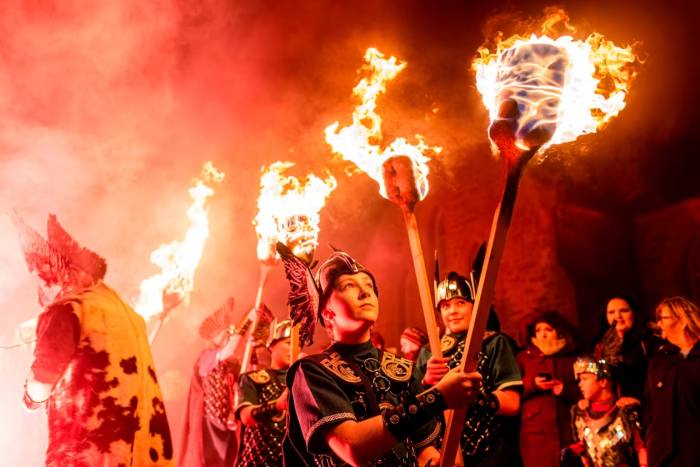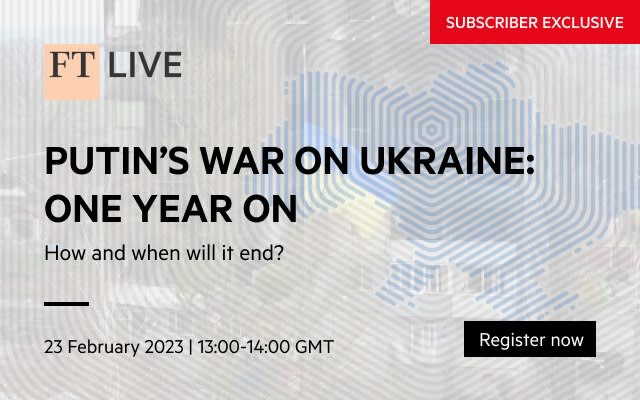[ad_1]
Good morning. This article is an on-site version of our FirstFT newsletter. Sign up to our Asia, Europe/Africa or Americas edition to get it sent straight to your inbox every weekday morning
Europe must do more to fight back against “massive” hidden handouts doled out by China to its industries, the European Commission president said today, as the EU rushes to counter a swath of global subsidies that threaten its competitiveness.
Speaking after European leaders discussed how to respond to US president Joe Biden’s $369bn climate bill, which is luring green businesses across the Atlantic, Ursula von der Leyen said the EU also needed to do more to deal with Beijing’s support for its domestic industries.
“Where China is concerned we know they are giving massive subsidies, not only [to] the clean-tech sector but in general,” von der Leyen said in a press conference after a summit of EU leaders. “So the topic is much wider than our focus on [Biden’s Inflation Reduction Act]. Therefore we are developing a much broader strategy to deal with that.”
While the IRA was “clearly defined and targeted” at six clean-tech sectors, meaning that the EU was finding it “very open and transparent” to deal with, she said the situation in China was far more opaque with “hidden subsidies” and a wider range of sectors affected.
Five more stories in the news
1. Adani hires US legal powerhouse Wachtell Indian billionaire Gautam Adani has hired New York’s Wachtell, Lipton, Rosen & Katz, one of Wall Street’s fiercest activism defence law firms to fight back against fraud claims, highlighting the severe international pressure the group faces following the allegations made by US short seller Hindenburg Research.
2. Peltz calls off Disney proxy fight Nelson Peltz has ended one of the biggest corporate battles in recent years a day after Walt Disney unveiled a restructuring plan involving the loss of 7,000 jobs. The activist investor’s retreat removes a distraction for chief executive Bob Iger, who is seeking to steer the company’s lossmaking streaming services towards profitability.
3. Chinese balloon had ‘multiple antennas’ The Chinese balloon that crossed the continental US last week had “multiple antennas” for intelligence gathering and was part of a broader surveillance fleet, a senior US state department official said yesterday. The US said the Chinese have used these surveillance balloons over more than 40 countries and five continents.
4. ‘Where’s the aid?’ Turkish earthquake survivors have been left to bury their own family members as the state struggles to respond to the disaster. In a country with a large and active government, many have been left shocked and enraged by the sudden vacuum after earthquakes in Turkey and neighbouring Syria claimed around 20,000 lives.

5. Trafigura faces $577mn hit from alleged fraud Trafigura has alleged it has been the victim of a “systematic fraud” and faces a writedown in excess of half a billion dollars after discovering shipments of nickel that it purchased failed to contain the metal. It has begun legal action against a group of companies “connected to and apparently controlled” by a Dubai-based metals trader.
How well did you keep up with the news this week? Take our quiz.
The day ahead
Economic data The UK publishes flash first-quarter gross domestic product figures and trade balance and industrial production data for December. Germany and Norway have consumer price indices for last month, while Canada has its unemployment rate for the same month. The University of Michigan will release its survey on US consumer sentiment.
UK strikes Ambulance workers from the Unite and Unison unions are set to strike in London, the South West, North West, North East, Yorkshire and the West Midlands.
Corporate results Aker BP and Saab report.
Join us on February 23 at 1pm GMT for a subscriber-only webinar, Putin’s war on Ukraine: how and when will it end? with the FT’s Ben Hall, Chris Miller and guests. Register for your free ticket at ft.com/ukraine-event.
What else we’re reading
Putin has ‘lost the energy war’, top trader claims Russian president Vladimir Putin has “lost the energy war”, according to Pierre Andurand, one of the world’s top-performing traders in the sector. Andurand said he had closed out all his positions in natural gas markets because last year’s price surge to record levels was unlikely to be repeated, with Europe learning rapidly to live without Russian gas.
Opinion: UK’s conservation areas are not that green It’s not easy being green in a conservation area, writes John Burn-Murdoch. Some may think these areas would be good for the natural environment, but more often outdated and overprotective regulations preserve the “character” of England’s ageing housing stock at all costs, even substantial environmental ones.

Sunak approaches moment of truth on N Ireland For UK prime minister Rishi Sunak, the moment of truth is approaching on whether he can strike a deal to settle the corrosive row over the post-Brexit settlement in Northern Ireland. As talks intensify, he faces many questions but one above all others: what role, if any, he can accept for judges at the European Court of Justice on UK territory.
Rothschilds fight on as another dynasty dies The death, in June last year, of Lazard scion Michel David-Weill has led to a coup at Eurazeo, once part of the complex cascade of holding companies that controlled the investment bank for the family. The fate of Lazard’s legacy is a cautionary tale on family ownership for the Rothschilds as they seek to take their bank private.
The urban ideal borrows from the past When done well, the 21st century enhances cities. WiFi has turned cafés, parks, even beaches into workspaces. Tinder and LinkedIn introduce you to people, and Google Maps helps you find them. But the best physical bits of today’s best cities were built by our ancestors. Modernity often just makes cities worse, writes Simon Kuper.
Take a break from the news
Up Helly Aa, Shetland’s wild, weird, annual Viking-inspired fire festival is back with blazing torches, a burning longboat and — for the first time — women.

Thank you for reading and remember you can add FirstFT to myFT. You can also elect to receive a FirstFT push notification every morning on the app. Send your recommendations and feedback to firstft@ft.com
[ad_2]
Source link


Comments are closed.